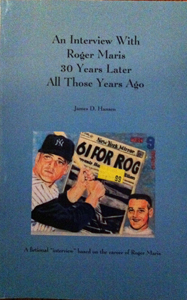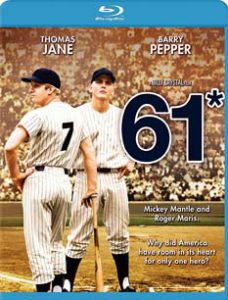NDSU Spectrum: Movie review
Pepper’s flawless portrayal of Maris makes ‘61*’ a hit
By JOHN HANSEN
April 27, 2001
Amazingly, prior to “61*,” there had never been a film made about Roger Maris’s and Mickey Mantle’s home run chase of 1961. Now, after the film makes its national debut at 8 p.m. tomorrow on HBO, no one will ever have to make one again, because director Billy Crystal and screenwriter Hank Steinberg have hit a home run their first time at bat.
Spirit of ’61
The film, which played at the Fargo Theater last weekend, lovingly captures the spirit of ’61 without pulling any punches. Maris aficionados will treasure the film’s accuracy, and casual viewers will be swept away by a true story that was pretty much tailor-made for Hollywood.
Yeah, Fargo natives are as familiar with Maris’ story as they are with snow in January. But it’s one thing to know as cold, hard facts that Maris was “a good family man unprepared for the rabid New York press,” and another thing to actually see him receive death threats in the mail and have chairs hurled at him as he plays right field.

“61*” (2001)
Starring: Barry Pepper, Thomas Jane, Jennifer Crystal, Christopher Bauer, Christopher McDonald, Anthony Michael Hall, Bob Gunton, Bruce McGill, Donald Moffat
Written by: Hank Steinberg
Director: Billy Crystal
Barry Pepper’s (“The Green Mile”) portrayal of Maris is flawless; there has never been a more accurate portrayal of a famous athlete. He looks exactly like Maris, he bulked up to achieve the slugger’s physique, and he captures Maris’s shy Midwestern disposition perfectly.
Of course, having Maris as the hero distinguishes “61*” from your standard Hollywood fare. Because while Babe Ruth, Mickey Mantle and Mark McGwire are known for their personalities, Maris is known for only one thing: his 61 in ’61.
The real Maris
This movie will change that. Sure, Maris never gave a good quote, never drove drunk and ran his car up the curb and never cheated on his wife. But “61*” shows us the real Maris, someone the tabloids never covered.
This is a guy who let Mantle move in with him to get his life back on track, a guy who desperately missed his wife and kids during the baseball season, a guy who smoked like a chimney and whose hair fell out from the pressure. A guy who said 1961 was “the best season of my life … and I’d never want to do it again.”
Thomas Jane (“Deep Blue Sea”) gives a solid performance as Mantle. He doesn’t really look like the Mick and doesn’t get the Southern drawl quite right, but he certainly has the swearing, carousing and tragic heroism down pat.
Of course, it was the injury-plagued superstar who could do more with one arm than most players could with two who bowed out of the race in September while a “good” ballplayer with a crewcut broke the record. Jane should’ve stolen the show, but thanks to Pepper’s portrayal, it’s the stoic Maris that the viewer keeps coming back to.
Attention to detail
The attention to detail in “61*” is so extensive that only Crystal, who idolized Mantle as a youngster and befriended him as an adult, could have pulled it off. Tiger Stadium was painted the romantic green color of Yankee Stadium before it’s remodeling phase of the ‘70s.
The M&M Boys’ batting stances are exact, and even the famous scene of Maris being pushed out of the dugout by his teammates to doff his cap after No. 61 is copied perfectly.
Clips of McGwire’s 61st and 62nd homeruns of 1998 make an excellent framing mechanism for the film, because McGwire’s adulation from Cardinal fans perfectly contrasts with Yankee fans’ indifference toward Maris (the final game of ’61 didn’t come close to selling out).
While Ruth’s widow couldn’t stand to see Maris hit No. 61 because “the Babe loved that record,” the Maris kids applauded and hugged McGwire when he hit No. 62.
Worthy of an asterisk
In 1998, some pitchers said they’d give McGwire a fastball down the middle so he could hit No. 62 off them. I
n 1961, the Orioles brought in knuckleballer Hoyt Wilhelm specifically to hurt Maris’ chances of hitting No. 60 in the 154th game, the last game in which the record could be “officially” tied or broken, since that’s how many games there were when Ruth played.
Although commissioner Ford Frick’s infamous asterisk was dropped from the record books in 1991, “61*” is a wonderfully ironic title for this film about an achievement worthy of a distinguishing mark.
After all, Maris wasn’t like Ruth, Mantle or McGwire. That’s kind of why we like him.
Grade: A+

More about Maris
Want to learn more about Roger Maris as we celebrate 60 years of 61 in ’61? My dad, James D. Hansen, wrote a fictional interview with his baseball hero in 1991, and published it in 1998 — the year of McGwire and Sosa. Titled “An Interview with Roger Maris: 30 Years Later — All Those Years Ago,” the 99-page book can be ordered in paperback or e-book format from Amazon.

